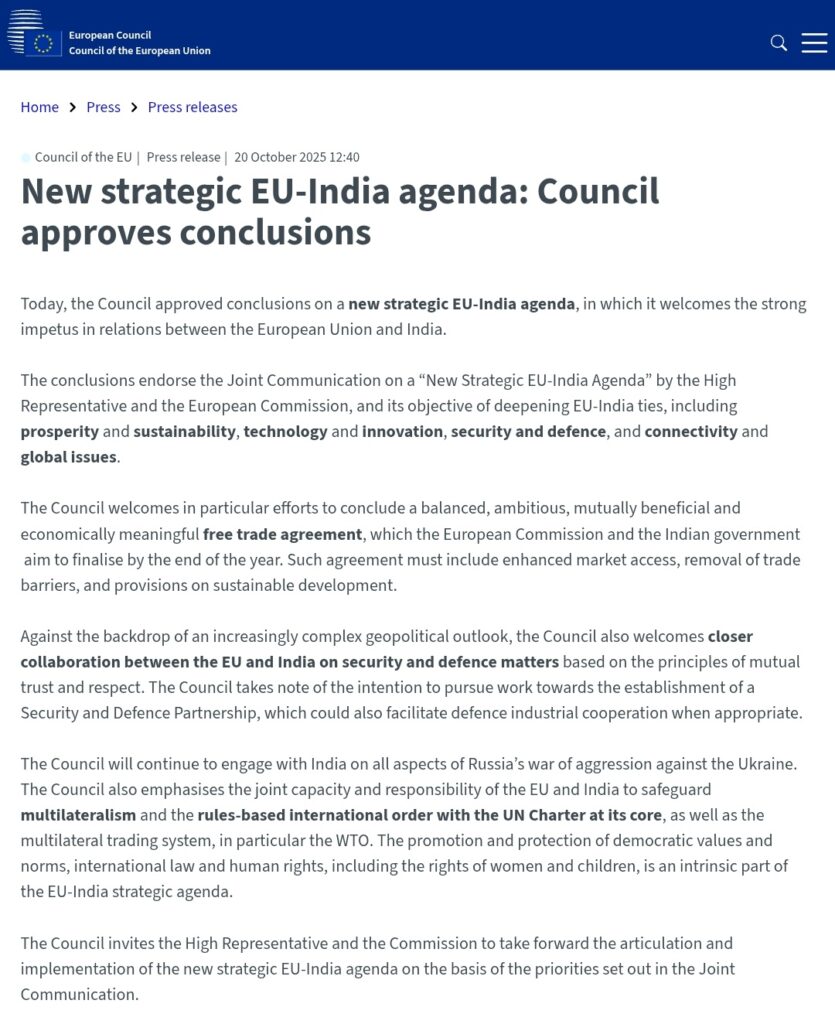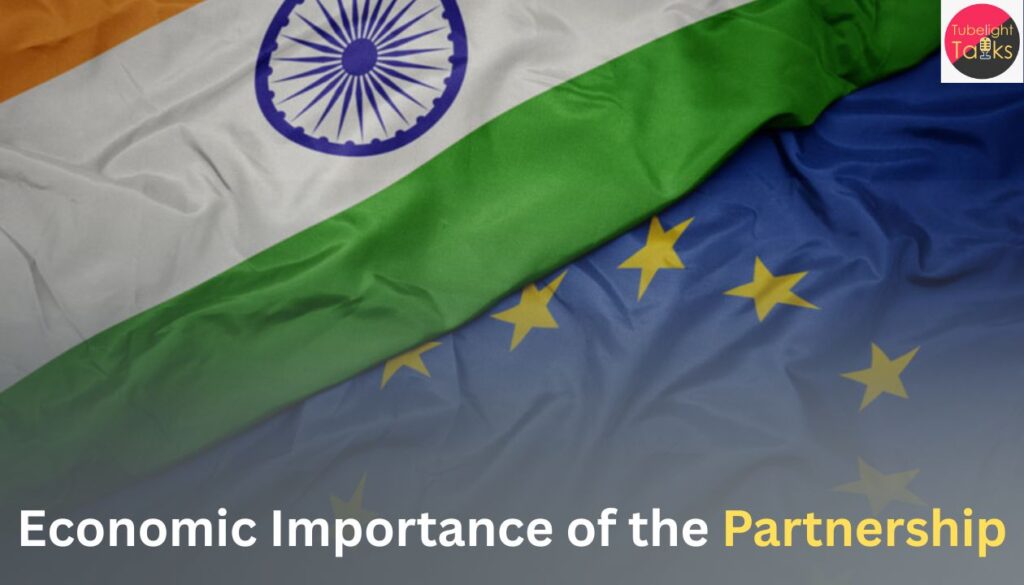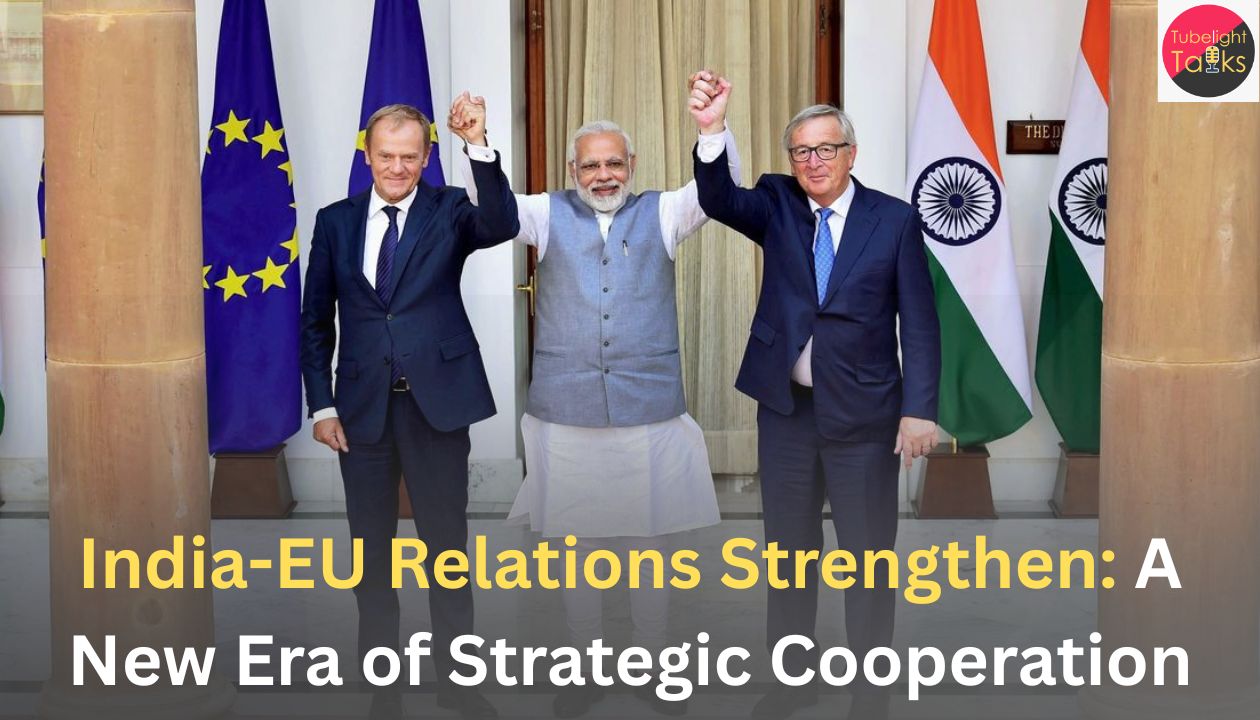India-EU Relations Strengthen: A New Era of Strategic Cooperation
India-EU Relations Strengthen: India and the European Union (EU) have emerged as pivotal partners in a rapidly changing geopolitical landscape, working toward shared goals of peace, sustainability and global prosperity. The EU Council recently announced a comprehensive strategy to strengthen political, economic and security ties with India. It marks a significant milestone in bilateral relations. This is not only a diplomatic achievement but also a global realignment where India is recognized as a key strategic player in shaping the 21st century world order.
Historical Background
In the early 1960s, diplomatic ties between India and the European Union were formally established in 1962. Over the decades, multiple frameworks — from trade and investment to culture, technology, and climate cooperation — helped evolve these relations. Later, the India-EU strategic partnership, launched in 2004, laid the foundation for structured political dialogues and sectoral cooperation. However, roadblocks – particularly concerning market access, data privacy, agricultural tariffs and labor mobility often faced by trade negotiations. Despite these hurdles, sharing of common democratic values and a commitment to multilateralism were maintained by both sides.
The New Strategy: A Stronger and Deeper Partnership
The latest decision of the EU Council represents a renewed political will to upgrade ties across multiple dimensions.

Key highlights include:
1. Economic and Trade Expansion:
In economic terms, the EU aims to increase bilateral trade with India, which already stands at over €120 billion every year. Talks on the India-EU Free Trade Agreement (FTA) had stalled for nearly a decade. Now it has been reenergized. Reducing tariff barriers, enhancing digital trade and boosting investments in manufacturing, green technologies and startups are the focused areas.
2. Defence and Security Cooperation:
Though, global tensions are rising from Indo-Pacific to Eastern Europe, India and EU are moving toward deeper defence dialogue, joint naval exercises and cybersecurity partnership. The EU supports India’s role as a net security provider in the Indo-Pacific region which is crucial for global maritime trade and stability.
3. Green Transition and Climate Collaboration:
The Green Partnership of India-EU aims to mobilize technology, finance and expertise to achieve climate goals consistent with the Paris Agreement. Both partner countries are working on joint initiatives in renewable energy, electric mobility and carbon neutrality.
4. Digital and Technological Innovation:
Both partners focus primarily on cooperation in Artificial Intelligence (AI), semiconductors and data governance. To ensure data protection and ethical tech use, the EU has expressed its willingness to support the “Digital India” mission of India.
5. People-to-people and Educational Exchanges:
Both sides have agreed to simplify visa processes for skilled professionals and students by strengthening cultural diplomacy.
New scholarship programs and youth exchanges under the Erasmus+ framework will also expand.
Economic Importance of the Partnership

The EU is a major investor in India’s growth story. It is also India’s second-largest trading partner after the United States. Over 6000 European companies are currently operating in India. They are generating millions of jobs in various sectors like automotive, pharmaceuticals and information technology.
As Europe attempts to reduce dependency on China for critical minerals, pharmaceuticals and semiconductors, India stands out as a reliable, democratic, and fast growing alternative. For Europe’s supply chain diversification, India is becoming increasingly vital.
Geopolitical significance
This new partnership between India and the EU goes beyond economics; it is a matter of strategic geopolitics. The EU sees India as a bridge between East and West, capable of mediating in global dialogues while upholding democratic norms. Strong ties with the EU mean enhanced leverage on global platforms for India, such as the G20, United Nations and World Trade Organization.
India-EU collaboration is crucial for global governance because together they represent over 1.8 billion people and nearly 25% of global GDP.
Challenges Ahead
Though optimism is high, several challenges persists, as follows:
1. Trade Negotiations: Long pending disagreements over tariffs remain unresolved such as tariffs on automobiles, wines, spirits and agricultural products.
2. Human Rights Concerns: India views interference in internal matters because some EU members occasionally raise human rights and data privacy issues.
3. Strategic Autonomy: India avoids taking rigid sides which sometimes complicates western alignment expectations. India maintains a non aligned foreign policy.
4. Migration Policies: Europe’s have tightened immigration rules, which may affect Indian professionals to enhance people to people ties.
Despite these, the renewed political and economic commitment indicates a shared understanding that cooperation outweighs differences.
Recent Developments Driving the Momentum
1. 2025 EU-India summit: It is scheduled for early 2026. This summit is expected to finalize new trade agreements and green technology investments.
2. Defence Dialogue in Brussels (2025): To discuss joint maritime operations in the Indian Ocean, India’s Defence Secretary met EU officials.
3. Digital Partnership MoU: It was signed to foster collaboration in 5G, cybersecurity and quantum technologies.
4. Joint Funding Program: Focusing on clean energy and sustainable agriculture, a €100 million Innovation fund was launched for startups.
Expert Opinions
1. Dr. C. Raja Mohan (Foreign Policy Analyst): “The India-EU partnership is entering a mature phase. It’s no longer about aid or trade alone. It’s about shaping the future of global governance.”
2. Ursula von der Leyen (President, European Commission): “India is a trusted partner. Together, we can build a more sustainable and secure world.”
3. India’s Ministry of External Affairs Statement: “The EU remains one of India’s most important strategic partners. Our collaboration reflects shared democratic values and mutual respect.”
Impact on Global Politics
In following three ways, this alliance reshapes power dynamics:
1. Strategic Balance: This partnership ensures multipolar stability in Asia, serving as a counterweight to China’s growing influence.
2. Energy and Climate Diplomacy: Joint green initiatives could set new global standards in clean energy cooperation.
3. Technology and Innovation: While offering Europe access to cost effective innovation ecosystems, collaborative R&D programs can make India a global tech manufacturing hub.
Future Prospects
Bilateral trade could double by 2030, if the Free Trade Agreement (FTA) is concluded successfully. European technology and investment can accelerate India’s industrial modernization while India’s youth and growing middle class provide Europe with a lucrative consumer market. Encompassing defence, technology, education and sustainable development, the long term goal is to develop a “Comprehensive Strategic Partnership”.The deepening of India-EU relations marks a turning point in global diplomacy. The partnership is poised to create a new model of cooperative global leadership from trade and technology to climate and culture. It depends on shared progress and trust, and not on domination.
The India-EU partnership stands as a beacon of balanced diplomacy and collective growth as the world faces challenges like climate change, digital security and economic instability. It is one that may define the next chapter of international relations.
Also Read: EU Council Approves Strategic Roadmap to Strengthen EU‑India Ties
Role of Sant Rampal Ji Maharaj
In the era of global partnership, Sant Rampal Ji Maharaj emphasizes the importance of true spiritual knowledge (satgyan) as the foundation of lasting harmony between nations. His teachings highlight that when individuals and leaders are guided by spiritual principles, they act with righteousness, honesty, and compassion. As a result, global relations naturally flourish with mutual respect and justice. The message of equality and peace given by Sant Rampal Ji Maharaj aims to build a world based on unity and moral strength. It aligns perfectly with the cooperative spirit of India-EU relations.
FAQs
1. What is the main focus of the India-EU partnership?
Ans: The India-EU partnership mainly focuses on strengthening cooperation in trade, technology, climate change, digital innovation and security to promote sustainable global development.
2. What is the India-EU Free Trade Agreement (FTA)?
Ans: The FTA is a proposed trade deal between India and the European Union aimed at reducing tariffs, improving market access and boosting economic growth on both sides.
3. How does the EU support India in the Indo-Pacific region?
Ans: The European Union supports India’s role in maintaining peace, stability and rules based international order in the Indo-Pacific region through strategic dialogues and joint maritime initiatives.
4. How are India and the EU working together on climate change?
Ans: Both sides collaborate under the India-EU Clean Energy and Climate Partnership focusing on renewable energy, carbon reduction and sustainable development projects.
5. What is the role of the India-EU Trade and Technology Council (TTC)?
Ans: The TTC serves as a platform to strengthen cooperation in trade, technology and security, particularly in areas like artificial intelligence (AI), semiconductors and data governance.
6. How is education a key part of India-EU relations?
Ans: Enhancing cultural understanding and educational collaboration between the two regions, thousands of Indian students study in EU countries under exchange programs like Erasmus+.











Discussion (0)